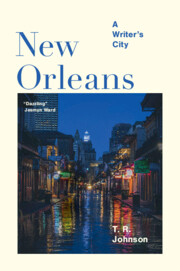Book contents
- New Orleans
- Imagining Cities
- New Orleans
- Copyright page
- Dedication
- Contents
- A Writer’s City
- Chronology
- Map
- Introduction
- 1 Royal Street – A Masked Ball
- 2 St. Claude Avenue – Hard Times and Good Children
- 3 Esplanade Avenue – Escape Routes
- 4 Basin Street – Memory and Music
- 5 St. Charles Avenue – Blood and Money
- 6 Outskirts – Writing through Loss
- Want More?
- Acknowledgments
- Notes
- Index
- Plate Section
1 - Royal Street – A Masked Ball
Between Canal and Esplanade
Published online by Cambridge University Press: 23 February 2023
- New Orleans
- Imagining Cities
- New Orleans
- Copyright page
- Dedication
- Contents
- A Writer’s City
- Chronology
- Map
- Introduction
- 1 Royal Street – A Masked Ball
- 2 St. Claude Avenue – Hard Times and Good Children
- 3 Esplanade Avenue – Escape Routes
- 4 Basin Street – Memory and Music
- 5 St. Charles Avenue – Blood and Money
- 6 Outskirts – Writing through Loss
- Want More?
- Acknowledgments
- Notes
- Index
- Plate Section
Summary
The literary history of Royal Street in New Orleans begins with the folktales of the flatboatmen, the songs of the enslaved trafficked through the city, and the Afro-Creole poets of the 1840s–1860s. It then continues in the late nineteenth century with major, national voices on the subject of the city (Cable, Hearn, King, Davis), and the arrival of O. Henry at the turn of the century. It then flowered again in the 1920s with the bohemian circle around Sherwood Anderson and William Faulkner, with the emergence of Truman Capote and Tennessee Williams in the 1940s, and then yet again with the various 1960s undergrounds of John Rechy, Robert Stone, The Outsider Magazine, and organized crime figures implicated in the Kennedy assassination. There then followed in the 1970s and 80s a series of important books rooted in a mythological vision of the area by Ishmael Reed, Tom Robbins, Anne Rice, Harry Crews, Dalt Wonk, and Paula Fox. The neighborhood’s most recent literary masterpiece appeared in 2003 in Valerie Martin’s Property. Much of the major writing of this neighborhood shares an interest in masks – identities concealed, divided, fabricated, transformed, or sustained against the odds in both stories and story-telling.
Keywords
- Type
- Chapter
- Information
- New OrleansA Writer's City, pp. 10 - 65Publisher: Cambridge University PressPrint publication year: 2023

